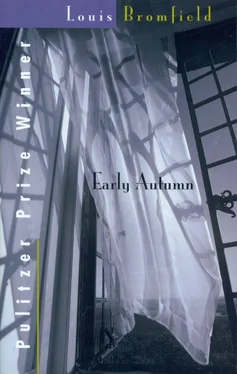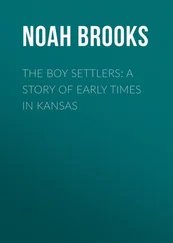A flock of glistening white gulls, sweeping in from the sea, soared toward them screaming wildly, and she said, “We’d better find a place to eat.”
She had taken from the hands of Sabine the task of showing Jean this little corner of his own country, and today they had come to see the view from the burial ground and read the moldering queer old inscriptions on the tombstones. On entering the graveyard they came almost at once to the little corner allotted long ago to immigrants with the name of Pentland—a corner nearly filled now with neat rows of graves. By the side of the latest two, still new and covered with fresh sod, they halted, and she began in silence to separate the flowers she had brought from her mother’s garden into two great bunches.
“This,” she said, pointing to the grave at her feet, “is his. The other grave is Cousin Horace Pentland’s, whom I never saw. He died in Mentone. … He was a first cousin of my grandfather.”
Jean helped her to fill the two vases with water and place the flowers in them. When she had finished she stood up, with a sigh, very straight and slender, saying, “I wish you had known him, Jean. You would have liked him. He was always good-humored and he liked everything in the world … only he was never strong enough to do much but lie in bed or sit on the terrace in the sun.”
The tears came quietly into her eyes, not at sorrow over the death of her brother, but at the pathos of his poor, weak existence; and Jean, moved by a quick sense of pity, took her hand again and this time kissed it, in the quaint dignified foreign way he had of doing such things.
They knew each other better now, far better than on the enchanted morning by the edge of the river; and there were times, like this, when to have spoken would have shattered the whole precious spell. There was less of shyness between them than of awe at the thing which had happened to them. At that moment he wanted to keep her forever thus, alone with him, on this high barren hill, to protect her and feel her always there at his side touching his arm gently. Here, in such a place, they would be safe from all the unhappiness and the trouble which in a vague way he knew was inevitably a part of living.
As they walked along the narrow path between the rows of chipped, worn old stones they halted now and then to read some half-faded, crumbling epitaph set forth in the vigorous, Biblical language of the first hardy settlers—sometimes amused, sometimes saddened, by the quaint sentiments. They passed rows of Sutherlands and Featherstones and Canes and Mannerings, all turned to dust long ago, the good New England names of that little corner of the world; and at length they came to a little colony of graves with the name Milford cut into each stone. Here there were no new monuments, for the family had disappeared long ago from the Durham world.
In the midst of these Jean halted suddenly and, bending over one of the stones, said, “Milford … Milford. … That’s odd. I had a great-grandfather named Milford who came from this part of the country.”
“There used to be a great many Milfords here, but there haven’t been any since I can remember.”
“My great-grandfather was a preacher,” said Jean. “A Congregationalist. He led all his congregation into the Middle West. They founded the town my mother came from.”
For a moment Sybil was silent. “Was his name Josiah Milford?” she asked.
“Yes. … That was his name.”
“He came from Durham. And after he left, the church died slowly. It’s still standing … the big white church with the spire, on High Street. It’s only a museum now.”
Jean laughed. “Then we’re not so far apart, after all. It’s almost as if we were related.”
“Yes, because a Pentland did marry a Milford once, a long time ago … more than a hundred years, I suppose.”
The discovery made her happy in a vague way, perhaps because she knew it made him seem less what they called an “outsider” at Pentlands. It wouldn’t be so hard to say to her father, “I want to marry Jean de Cyon. You know his ancestors came from Durham.” The name of Milford would make an impression upon a man like her father, who made a religion of names; but, then, Jean had not even asked her to marry him yet. For some reason he had kept silent, saying nothing of marriage, and the silence clouded her happiness at being near him.
“It’s odd,” said Jean, suddenly absorbed, in the way of men, over this concrete business of ancestry. “Some of these Milfords must be direct ancestors of mine and I’ve no idea which ones they are.”
“When we go down the hill,” she said, “I’ll take you to the meeting house and show you the tablet that records the departure of the Reverend Josiah Milford and his congregation.”
She answered him almost without thinking what she was saying, disappointed suddenly that the discovery should have broken in upon the perfection of the mood that united them a little while before.
They found a grassy spot sheltered from the August sun by the leaves of a stunted wild cherry tree, all twisted by the sea winds, and there Sybil seated herself to open their basket and spread the lunch—the chicken, the crisp sandwiches, the fruit. The whole thing seemed an adventure, as if they were alone on a desert island, and the small act gave her a new kind of pleasure, a sort of primitive delight in serving him while he stood looking down at her with a frank grin of admiration.
When she had finished he flung himself down at full length on the grass beside her, to eat with the appetite of a great, healthy man given to violent physical exercise. They ate almost in silence, saying very little, looking out over the marshes and the sea. From time to time she grew aware that he was watching her with a curious light in his blue eyes, and when they had finished, he sat up cross-legged like a tailor, to smoke; and presently, without looking at her he said, “A little while ago, when we first came up the hill, you let me take your hand, and you didn’t mind.”
“No,” said Sybil swiftly. She had begun to tremble a little, frightened but wildly happy.
“Was it because … because … He groped for a moment for words and, finding them, went quickly on, “because you feel as I do?”
She answered him in a whisper. “I don’t know,” she said, and suddenly she felt an overwhelming desire to weep.
“I mean,” he said quietly, “that I feel we were made for each other … perfectly.”
“Yes … Jean.”
He did not wait for her to finish. He rushed on, overwhelming her in a quick burst of boyish passion. “I wish it wasn’t necessary to talk. Words spoil everything. … They aren’t good enough. … No, you must take me, Sybil. Sometimes I’m disagreeable and impatient and selfish … but you must take me. I’ll do my best to reform. I’ll make you happy. … I’ll do anything for you. And we can go away together anywhere in the world … always together, never alone … just as we are here, on the top of this hill.”
Without waiting for her to answer, he kissed her quickly, with a warm tenderness that made her weep once more. She said over and over again, “I’m so happy, Jean … so happy.” And then, shamefacedly, “I must confess something. … I was afraid you’d never come back, and I wanted you always … from the very beginning. I meant to have you from the beginning … from that first day in Paris.”
He lay with his head in her lap while she stroked the thick, red hair, in silence. There in the graveyard, high above the sea, they lost themselves in the illusion which overtakes such young lovers … that they had come already to the end of life … that, instead of beginning, it was already complete and perfect.
“I meant to have you always … Jean. And after you came here and didn’t come over to see me … I decided to go after you … for fear that you’d escape again. I was shameless … and a fraud, too. … That morning by the river … I didn’t come on you by accident. I knew you were there all the while. I hid in the thicket and waited for you!”
Читать дальше












